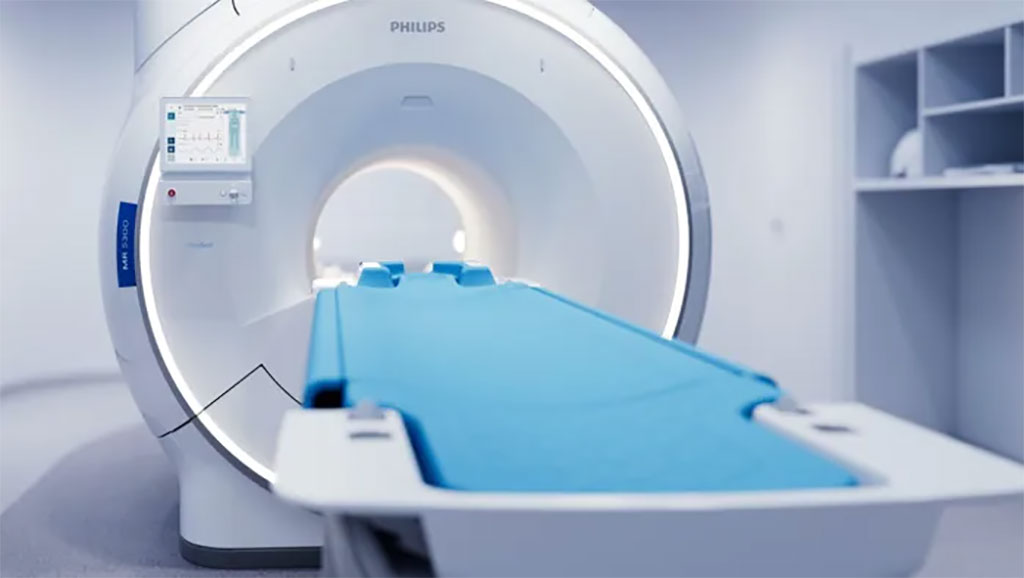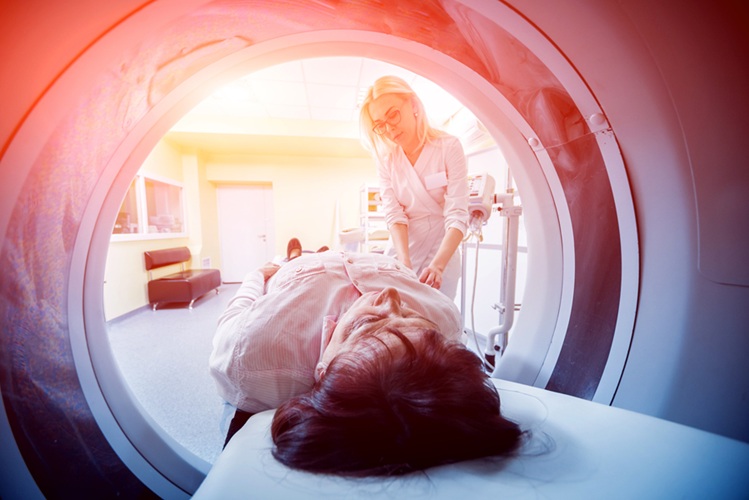Philips Launches New AI-Enhanced MR Innovations at RSNA 2021
|
By MedImaging International staff writers Posted on 29 Nov 2021 |

Royal Philips (Amsterdam, Noord-Holland) launched new AI-enabled innovations in MR imaging at the Radiological Society of North America (RSNA) annual meeting (November 23 – December 2, Chicago, USA).
Philips’ new MR portfolio of intelligent integrated solutions is designed to speed up MR exams, streamline workflows, optimize diagnostic quality, and help ensure the efficiency and sustainability of radiology operations. As MR imaging plays an ever-increasing role in precision diagnosis, radiology departments face multiple challenges such as workload demands due to the backlog of cases resulting from the COVID-19 pandemic, a growing population of clinically challenging patients, and a worldwide shortage of skilled technicians. As a result, there is a clear need for smart diagnostic systems, optimized workflows, and integrated clinical solutions that reduce time-to-diagnosis, improve patient throughput, reduce the need for rescans, and enhance the patient and staff experience.
Among several new AI-enhanced MR innovations launched by Philips at RSNA 2021 were Philips SmartSpeed, designed to speed up image acquisition and enhance image quality and diagnostic confidence for every patient, and the company’s new MR Workspace with AI assistance, which delivers an intuitive solution to simplify the path from image acquisition to diagnosis to help improve MR workflow and staff experience. Other introductions included the company’s new MR 5300 and MR 7700 smart connected systems.
Philips’ new MR 5300 system introduced for the first time at RSNA 2021, has received 510(k) clearance from the U.S. Food and Drug Administration (FDA). With this introduction, the company’s latest BlueSeal fully-sealed helium-free in operations MR scanner continues the advancement of a full helium-free operating portfolio of Philips MR solutions. Powered by AI, the MR 5300 simplifies and automates complex clinical and operational tasks for outpatient clinical use and MR departments to help increase access to affordable, quality care. The MR 5300’s large (55cm) field-of-view provides extended anatomical coverage, while its robust AI-powered scanning methods and easily positioned ultra-lightweight dStream Breeze coils work together to generate exceptional image quality, especially when imaging challenging anatomies such as the spine and abdomen. By simplifying and automating many of the complex clinical and operational tasks involved in capturing high-quality images, MR 5300 enhances the consistency and productivity of radiology department output, helping to increase patient satisfaction scores and referral rates. Its helium-free operations make it suitable for use in outpatient clinics, as well as dedicated radiology departments.
Also making its debut at RSNA 2021 was Philips’ new MR Workspace with AI assistance which is designed to simplify the path from image acquisition to diagnosis and empower technologists – regardless of their experience or patient challenges – to drive productivity and predictability. MR Workspace’s intuitive dashboard fully automates the planning and execution of many routine scans and eliminates guesswork by suggesting the most suitable Exam Card for each patient to ensure consistency in radiology department operations.
Another major reveal at RSNA 2021 was Philips’ new MR 7700 system integrated with multinuclear clinical capabilities to give clinical researchers the confidence to explore new imaging pathways. Researchers can also leverage the accuracy, power, and endurance of the MR 7700’s XP gradients to help facilitate demanding research programs to boost neuroscience excellence, and leverage the built-in AI technology for very high-performance clinical practice. The MR 7700’s gradient is designed to deliver the highest level of performance, state-of-the-art diffusion imaging, excellent signal-to-noise ratio (SNR), and motion detection technology to support outstanding imaging results. The MR 7700 system’s high homogeneity and linearity bring precision to both anatomical and functional imaging, supporting confident decision making. The system aims to tackle existing, new, and future clinical and research demands, while addressing the upswing in patient volumes experienced by many of today’s radiology departments. With this latest release, Philips has expanded to five additional nuclei to advance clinical insight with more metabolic and functional information across anatomies and making Multi Nuclei imaging a part of the daily MR clinical workflow.
At RSNA 2021, Philips also launched its new SmartSpeed reconstruction platform, designed to support the latest AI innovations. The platform, which features an award winning AI algorithm (Adaptive-CS-Net) applied directly at the source of the MR signal, is the next big advance on Philips’ existing Compressed SENSE acceleration technology, further enhancing the ability to reconstruct a full image from under-sampled data while maintaining virtually equivalent image quality. The projected speed advantages will help radiology departments to significantly increase patient throughput and enhance diagnostic confidence in a wider range of patients, including patients who are in pain, who struggle to hold their breath during the exam, or who have MR conditional implants. The SmartSpeed platform is designed to support 97% of current clinical protocols.
“At this year’s RSNA, we are focused on introducing scalable high performance MR systems to the imaging enterprise, with intelligent software built in to automate tasks to help relieve the burden on radiology staff and departments,” said Arjen Radder, General Manager of MR at Philips. “With AI-driven smart connected systems, optimized workflows, and integrated clinical solutions, our goal is to deliver high quality diagnostic images while also improving radiology department productivity by relieving radiologists of burdensome routine tasks so they have more time to take care of their patients.”
“At RSNA, we continue our commitment to helium-free sustainability in MR operations with new and enhanced technology to provide fast, fully automated, and highly personalized exams for every patient without compromising image quality, while also acting responsibly towards the planet and society,” Radder added.
Related Links:
Royal Philips
Latest MRI News
- Cutting-Edge MRI Technology to Revolutionize Diagnosis of Common Heart Problem
- New MRI Technique Reveals True Heart Age to Prevent Attacks and Strokes
- AI Tool Predicts Relapse of Pediatric Brain Cancer from Brain MRI Scans
- AI Tool Tracks Effectiveness of Multiple Sclerosis Treatments Using Brain MRI Scans
- Ultra-Powerful MRI Scans Enable Life-Changing Surgery in Treatment-Resistant Epileptic Patients
- AI-Powered MRI Technology Improves Parkinson’s Diagnoses
- Biparametric MRI Combined with AI Enhances Detection of Clinically Significant Prostate Cancer
- First-Of-Its-Kind AI-Driven Brain Imaging Platform to Better Guide Stroke Treatment Options
- New Model Improves Comparison of MRIs Taken at Different Institutions
- Groundbreaking New Scanner Sees 'Previously Undetectable' Cancer Spread
- First-Of-Its-Kind Tool Analyzes MRI Scans to Measure Brain Aging
- AI-Enhanced MRI Images Make Cancerous Breast Tissue Glow
- AI Model Automatically Segments MRI Images
- New Research Supports Routine Brain MRI Screening in Asymptomatic Late-Stage Breast Cancer Patients
- Revolutionary Portable Device Performs Rapid MRI-Based Stroke Imaging at Patient's Bedside
- AI Predicts After-Effects of Brain Tumor Surgery from MRI Scans
Channels
Radiography
view channel
AI Improves Early Detection of Interval Breast Cancers
Interval breast cancers, which occur between routine screenings, are easier to treat when detected earlier. Early detection can reduce the need for aggressive treatments and improve the chances of better outcomes.... Read more
World's Largest Class Single Crystal Diamond Radiation Detector Opens New Possibilities for Diagnostic Imaging
Diamonds possess ideal physical properties for radiation detection, such as exceptional thermal and chemical stability along with a quick response time. Made of carbon with an atomic number of six, diamonds... Read moreMRI
view channel
Cutting-Edge MRI Technology to Revolutionize Diagnosis of Common Heart Problem
Aortic stenosis is a common and potentially life-threatening heart condition. It occurs when the aortic valve, which regulates blood flow from the heart to the rest of the body, becomes stiff and narrow.... Read more
New MRI Technique Reveals True Heart Age to Prevent Attacks and Strokes
Heart disease remains one of the leading causes of death worldwide. Individuals with conditions such as diabetes or obesity often experience accelerated aging of their hearts, sometimes by decades.... Read more
AI Tool Predicts Relapse of Pediatric Brain Cancer from Brain MRI Scans
Many pediatric gliomas are treatable with surgery alone, but relapses can be catastrophic. Predicting which patients are at risk for recurrence remains challenging, leading to frequent follow-ups with... Read more
AI Tool Tracks Effectiveness of Multiple Sclerosis Treatments Using Brain MRI Scans
Multiple sclerosis (MS) is a condition in which the immune system attacks the brain and spinal cord, leading to impairments in movement, sensation, and cognition. Magnetic Resonance Imaging (MRI) markers... Read moreUltrasound
view channel.jpeg)
AI-Powered Lung Ultrasound Outperforms Human Experts in Tuberculosis Diagnosis
Despite global declines in tuberculosis (TB) rates in previous years, the incidence of TB rose by 4.6% from 2020 to 2023. Early screening and rapid diagnosis are essential elements of the World Health... Read more
AI Identifies Heart Valve Disease from Common Imaging Test
Tricuspid regurgitation is a condition where the heart's tricuspid valve does not close completely during contraction, leading to backward blood flow, which can result in heart failure. A new artificial... Read moreNuclear Medicine
view channel
Novel Radiolabeled Antibody Improves Diagnosis and Treatment of Solid Tumors
Interleukin-13 receptor α-2 (IL13Rα2) is a cell surface receptor commonly found in solid tumors such as glioblastoma, melanoma, and breast cancer. It is minimally expressed in normal tissues, making it... Read more
Novel PET Imaging Approach Offers Never-Before-Seen View of Neuroinflammation
COX-2, an enzyme that plays a key role in brain inflammation, can be significantly upregulated by inflammatory stimuli and neuroexcitation. Researchers suggest that COX-2 density in the brain could serve... Read moreGeneral/Advanced Imaging
view channel
AI-Based CT Scan Analysis Predicts Early-Stage Kidney Damage Due to Cancer Treatments
Radioligand therapy, a form of targeted nuclear medicine, has recently gained attention for its potential in treating specific types of tumors. However, one of the potential side effects of this therapy... Read more
CT-Based Deep Learning-Driven Tool to Enhance Liver Cancer Diagnosis
Medical imaging, such as computed tomography (CT) scans, plays a crucial role in oncology, offering essential data for cancer detection, treatment planning, and monitoring of response to therapies.... Read moreImaging IT
view channel
New Google Cloud Medical Imaging Suite Makes Imaging Healthcare Data More Accessible
Medical imaging is a critical tool used to diagnose patients, and there are billions of medical images scanned globally each year. Imaging data accounts for about 90% of all healthcare data1 and, until... Read more
Global AI in Medical Diagnostics Market to Be Driven by Demand for Image Recognition in Radiology
The global artificial intelligence (AI) in medical diagnostics market is expanding with early disease detection being one of its key applications and image recognition becoming a compelling consumer proposition... Read moreIndustry News
view channel
GE HealthCare and NVIDIA Collaboration to Reimagine Diagnostic Imaging
GE HealthCare (Chicago, IL, USA) has entered into a collaboration with NVIDIA (Santa Clara, CA, USA), expanding the existing relationship between the two companies to focus on pioneering innovation in... Read more
Patient-Specific 3D-Printed Phantoms Transform CT Imaging
New research has highlighted how anatomically precise, patient-specific 3D-printed phantoms are proving to be scalable, cost-effective, and efficient tools in the development of new CT scan algorithms... Read more
Siemens and Sectra Collaborate on Enhancing Radiology Workflows
Siemens Healthineers (Forchheim, Germany) and Sectra (Linköping, Sweden) have entered into a collaboration aimed at enhancing radiologists' diagnostic capabilities and, in turn, improving patient care... Read more




 Guided Devices.jpg)
















